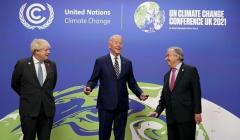Published: November 1, 2021
-CNS News
(CNSNews.com) – Americans who several years ago weren’t sure if climate change was “real” have “seen the Lord,” President Biden told an event at the U.N. climate summit in Glasgow, Scotland on Monday.
Getting them to realize that the U.S. has an obligation to step up financing to help developing countries address climate change is “the next big case that I’m going to have to make at home,” he added.
“The American people, four or five years ago, weren’t at all sure about climate change – whether it was real,” Biden told the COP26 event entitled “Action and Solidarity: The Critical Decade.”
“Well, they have, as they say in southern parts of my state, ‘seen the Lord,’” he said. “They’ve seen what’s happened back home, the incredible changes that are taking place. And they’re now finally, finally, finally realizing the sense of urgency that you all are.”
Alluding to greenhouse gas emissions attributed to industrialization, the burning of fossil fuels, and other activities, Biden said developed nations whose actions a long time ago “caused the problems we have, we have to be ready to step up for everyone, from Tanzania to – uh, to Fiji, to make sure that they have the wherewithal.”
“I have to acknowledge to you: That’s the next big case that I’m going to have to make at home,” he said. “They now know there is climate change, and they’re ready to step up. But we got to make sure they know that the United States has an obligation to also step up at financing, financing other, other countries that are – have not had the opportunity to do as much damage as we have, and have an opportunity to get much better.”
In earlier remarks at the conference leaders’ summit, Biden said the U.S. is “going to try to do our part when it comes to helping the rest of the world take action as well.”
“We want to do more to help countries around the world, especially developing countries, accelerate their clean-energy transition, address pollution, and ensure the world we all must share a cleaner, safer, healthiest planet,” he said. “And we have an obligation to help.”
Biden recalled that when addressing the U.N. General Assembly in September, “I announced that my administration is working with the Congress to quadruple our climate finance support for developing countries by 2024, including a significant increase in support for adaptation efforts.”
At an earlier U.N. climate conference – COP15 in Copenhagen in 2009 – developed nations committed to a goal of jointly raising $100 billion a year from public and private sources, by 2020, to help developing countries curb carbon emissions and cope with phenomena blamed on climate change, such as drought and rising sea levels.
At Paris in 2015, the commitment was restated and extended through 2025.
The 2020 goal was reported not to have been met although the environment ministers of Canada and Germany, tasked by the U.N. to examine progress and ways to achieve the goal, are confident it will be by 2023.
(National Security Advisor Jake Sullivan, briefing reporters en route to Scotland on Monday morning, also voiced confidence about meeting the $100 billion goal by 2023.)
Biden on Monday announced a new initiative called the President’s Emergency Plan for Adaptation and Resilience (PREPARE), to help developing countries around “to adapt to and manage the impacts of climate change.”
“PREPARE will serve as a comprehensive framework to mobilize the U.S. government resources and expertise in support of climate adaptation efforts for more than a half a billion people worldwide,” he told the “Action and Solidarity” event.
The White House said the president would work with Congress to provide $3 billion a year for PREPARE by fiscal year 2024, “the largest U.S. commitment ever made to reduce climate impacts on those most vulnerable to climate change worldwide.”
The three main pillars of PREPARE will be to support efforts to deepen global understanding of climate risks and solutions; to help vulnerable countries plan for climate impacts; and to mobilize finance and private capital for “adaptation measures.”




